I know I promised an article about the Magi this week, but between regular Church worship and activities, Christmas gatherings, the New Year, presiding at Saint Basil’s Liturgy on my Name Day the next morning, and a wonderful family visit…I just wasn’t prepared. But I had this Post almost ready to go. So let’s hold the Wise Men off till next year. (Maybe they can wait for a year in Edessa or somewhere?)
In Matthew’s account of the Genealogy of Christ, there are fourteen generations from David to the Babylonian Captivity, and then fourteen more till the birth of Jesus Christ. I hope I counted right in the title above. If not, don’t tell me. I’m not going to do it again – trying to type and count at the same time!
With titles such as those above, I know the Fathers were making the point that Jesus Christ is truly God, but I wonder if they were also having a bit of fun trying to shock nonbelievers – maybe the Arians? “‘The Ancestor of the eternal God’ indeed!” they must have said. “And ‘The Grandparents of God’, and ‘The Brother of God!’ and worst of all ‘The Mother of God’, the ‘Bearer of God’, the ‘Birthgiver of God’, as if the infinite, uncircumscribable God could allow someone to carry him around!'” The Fathers were answering them joyfully, “But He did! He did!”
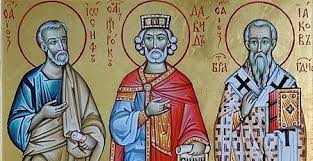
If it were not for their commemoration on the Sunday after the Nativity of Christ, we wouldn’t hear much about these three. James has his own day, October 23. We celebrate many Old Testament prophets, but I can’t find David on the Orthodox calendar. And other than today Saint Joseph, that righteous man, is almost ignored in the Orthodox Church. Shame on us! So now let’s briefly try to give them some of the honor they deserve.
David, the Ancestor of God
This (not the longer version above – I did that just to catch your attention) is the usual way of titling him, and for good reason!
1000 years before Christ, David was the greatest Jewish King. He is one of the most fascinating characters in history. I wish I could tell you his whole story here. It makes great reading. See 1 Samuel chapters 16 to the end, all of 2 Samuel, and 1 Kings 1 – 2:11. His story is also told from another “angle” in 1 Chronicles chapters 11-29, which concludes: “He died in happy old age, full of days, full of riches, of honor” – after a forty year reign.
But back to the beginning.
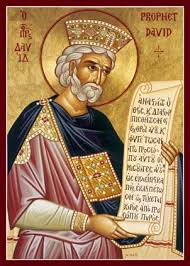 David, son of Jesse: A shepherd boy from Bethlehem. A young hero who killed the giant (don’t think 12′, more like 6’11” and big) enemy warrior Goliath with his slingshot. A musician who played the harp, a singer of songs and writer of poems. A deeply religious man: Many of the 150 Psalms so familiar to us who pray them every day are titled “Of David”. One of the best known is Psalm 22 (23) “The Lord is my shepherd…He leads me beside still waters, He restores my soul”.
David, son of Jesse: A shepherd boy from Bethlehem. A young hero who killed the giant (don’t think 12′, more like 6’11” and big) enemy warrior Goliath with his slingshot. A musician who played the harp, a singer of songs and writer of poems. A deeply religious man: Many of the 150 Psalms so familiar to us who pray them every day are titled “Of David”. One of the best known is Psalm 22 (23) “The Lord is my shepherd…He leads me beside still waters, He restores my soul”.
If you don’t read the Psalms you should. They are beautiful, as long as you choose a decent poetic translation, which many modern translation are not. (If you can handle “thees” and “thous”, I’m prejudiced towards the old Church of England King James Version. If not, then try the modern New King James Version. You can find many translations online. (Note that Protestant numbering of some Psalms is different from ours.) They apply to every situation in life – all our griefs and joys and confusions and sins and sorrows. Many prefigure the coming of our Lord Jesus Christ. With your daily prayers, why not add a Psalm each day till you’ve gone through them all? Just be prepared for Psalm 118 (119)!
David: made King of the Jews by popular acclamation, and thus began the golden age of the Jewish nation.
David: a tender loving man. Even after his son Absalom led a rebellion against his father and was killed, David wept over him: “Absalom, my son, my son, if only I had died instead of you.”
David a genuinely Godly man: He kept in his court the prophet Nathan, because he knew he would proclaim the true word of God whether David liked it or not. (There were many false prophets who told kings what they wanted to hear: “Good work, your majesty. Just keep it up.” Times don’t change.) It was Nathan who told David: Thus says the Lord “When…you lie down with your fathers, I will raise up your descendant after you and I will establish his kingdom…forever. I will be his father and he shall be my son.” Those words were echoed again and again through the Old Testament, till 1000 years after David the Angel Gabriel announced to the Virgin Mary: You shall give birth to a Son. He shall be called the Son of God, and “his Kingdom will never end”. We recite them again in the Creed at every Divine Liturgy, 3000 years after the prophet Nathan first proclaimed them to King David.
David: a ladies’ man, a sinner. You know the story of how David looked out his palace window one day and saw 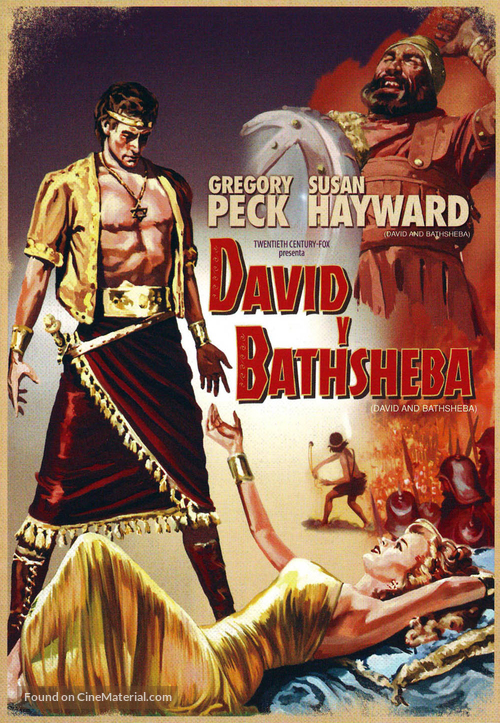 Bathsheba wife of Uriah in her room bathing. (Why she left the shade up the story doesn’t say, but may we guess?) This was the inspiration for some, shall we say, imaginative 1940s and 1950s movies. Right: Did I really need to include this ridiculous image? No. So he sent for her… and there she was pregnant. So David had her husband sent to the front line of battle and he was killed. After a suitable period of mourning Bathsheba became one of David’s wives. They thought they had got away with it, till one day Nathan came in and told David of a rich man with great flocks who killed his poor neighbor and took his only ewe. What should be done? He should be put to death, said David. Then Nathan cried: You are the man! David repented in grief and shame. Psalm 50 (51) is titled “A Psalm of David when Nathan the prophet went to him, after he had gone in to Bathsheba.” “Have mercy on me, O God, according to thy great mercy. According to the multitude of thy mercy do away my offenses. Wash me thoroughly from my iniquity and cleanse me from my sin…” We read David’s Psalm of Repentance daily in our Orthodox services.
Bathsheba wife of Uriah in her room bathing. (Why she left the shade up the story doesn’t say, but may we guess?) This was the inspiration for some, shall we say, imaginative 1940s and 1950s movies. Right: Did I really need to include this ridiculous image? No. So he sent for her… and there she was pregnant. So David had her husband sent to the front line of battle and he was killed. After a suitable period of mourning Bathsheba became one of David’s wives. They thought they had got away with it, till one day Nathan came in and told David of a rich man with great flocks who killed his poor neighbor and took his only ewe. What should be done? He should be put to death, said David. Then Nathan cried: You are the man! David repented in grief and shame. Psalm 50 (51) is titled “A Psalm of David when Nathan the prophet went to him, after he had gone in to Bathsheba.” “Have mercy on me, O God, according to thy great mercy. According to the multitude of thy mercy do away my offenses. Wash me thoroughly from my iniquity and cleanse me from my sin…” We read David’s Psalm of Repentance daily in our Orthodox services.
As prophesied, David’s line continued, and 28 generations later it led to:
Joseph the Betrothed of the Virgin Mary
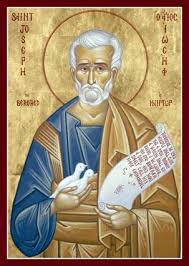 Don’t believe those Christmas card pictures with Joseph as a handsome young guy. Earliest tradition says Joseph was an older widower with grown children, a carpenter (or it can be translated craftsman) and a just man, it says. Mary, remember, had been raised in the temple. When she came to marrying age (about 13) and refused, and her parents were dead, the high priest had to do something. So by lot it fell on old Joseph to be her guardian and legal husband. She was younger than his own children. And then… the things he saw! As the Troparion for the Sunday before the Nativity of Christ tells us: “Joseph…you have seen a Virgin great with Child; you have given glory with the shepherds; you have worshipped with the Magi; And you have been instructed by an angel.” What wonders!
Don’t believe those Christmas card pictures with Joseph as a handsome young guy. Earliest tradition says Joseph was an older widower with grown children, a carpenter (or it can be translated craftsman) and a just man, it says. Mary, remember, had been raised in the temple. When she came to marrying age (about 13) and refused, and her parents were dead, the high priest had to do something. So by lot it fell on old Joseph to be her guardian and legal husband. She was younger than his own children. And then… the things he saw! As the Troparion for the Sunday before the Nativity of Christ tells us: “Joseph…you have seen a Virgin great with Child; you have given glory with the shepherds; you have worshipped with the Magi; And you have been instructed by an angel.” What wonders!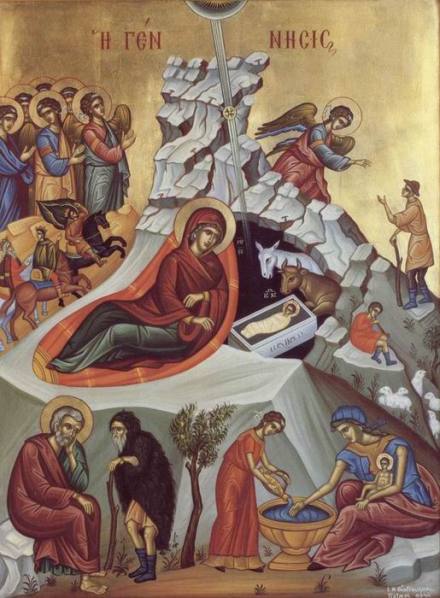
But there was also another side: Many Christmas icons show what it was like for him, withJoseph off in the corner, left out, sometimes with a strange little man (maybe Satan or a fallen angel? in disguise) tempting him to despair: How can I do this? at my age? foster father to the Son of God, guardian to the Mother of God.
Have you ever felt at your wits’ end? Yet by God’s grace Joseph handled it, our example that by the grace of God so can we.
When Jesus was twelve, His parents took Him up to Jerusalem for Passover. On the way home to Nazareth they realized He was not with them in the crowd. (It sounds as if He was gregarious, an independent Boy. But try to imagine a society in which parents would for three days just assume that He was ok.) They hurried back to Jerusalem, and found Him in the temple, very much at home 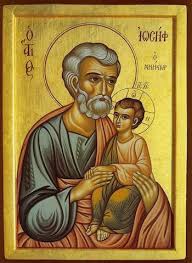 with the teachers and scholars there. Mary scolded Him (Imagine scolding God Incarnate!): “Son, how could you treat us like this? Your father and I have been anxious, looking for you.” Jesus answered “Did you not know I must be in my Father’s house?” (Many translate it “about my Father’s business”.) Mary obviously knew Her Son’s origin, but it says “at first they did not understand His words”. I love this icon, old Joseph with his little “adopted son”. Because Joseph had been His true father on earth – a truly humble man who guided the Boy all through His childhood, had spent time with Him, taught Him to be a carpenter like himself.
with the teachers and scholars there. Mary scolded Him (Imagine scolding God Incarnate!): “Son, how could you treat us like this? Your father and I have been anxious, looking for you.” Jesus answered “Did you not know I must be in my Father’s house?” (Many translate it “about my Father’s business”.) Mary obviously knew Her Son’s origin, but it says “at first they did not understand His words”. I love this icon, old Joseph with his little “adopted son”. Because Joseph had been His true father on earth – a truly humble man who guided the Boy all through His childhood, had spent time with Him, taught Him to be a carpenter like himself.
We never hear of Joseph again. Sometime before Jesus began His ministry, Joseph died. When? We do not know. We know only that it was before the Crucifixion, for from the Cross Christ left His Mother in the care of John. But I cannot help but think that when Christ descended into hades to rescue the dead, that when He first saw Joseph Jesus said to him, “Father!” And that Joseph said to Him, “My son!”
Roman Catholics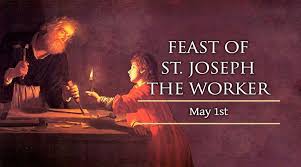 give Saint Joseph much honor right, but in our Orthodox Church he is almost the forgotten man. We hear little of him. Icons of Saint Joseph (except at Christmas off in a corner) are not common. I wish we paid him more attention. He deserves it. Holy Joseph, pray for us – we who have been made part of the Family of your “son” Jesus, just as you took Him into your family.
give Saint Joseph much honor right, but in our Orthodox Church he is almost the forgotten man. We hear little of him. Icons of Saint Joseph (except at Christmas off in a corner) are not common. I wish we paid him more attention. He deserves it. Holy Joseph, pray for us – we who have been made part of the Family of your “son” Jesus, just as you took Him into your family.
James the Brother of the Lord
Earliest tradition is clear that Mary had no other children, was “ever-Virgin” as we say in our prayers. The word “brother” in Hebrew can also mean “cousin” or other near relative, but earliest tradition is specific that James was Joseph’s son by his first marriage, thereby Jesus’ “step brother”. Some said that James was the first of Joseph’s family to believe in Christ, and that James went along with them into Egypt. 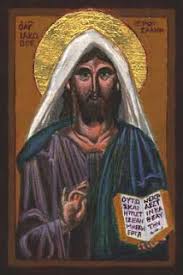 Old Joseph certainly could have used the help.
Old Joseph certainly could have used the help.
James had a special place in the early Church. I Corinthians 15 says that after the Resurrection, Peter and James received individual visitations from the Lord. This implies they were close to Him and He had a special task for each of them. In Galatians 1:18-19 Paul wrote that when he went up to Jerusalem three years after his conversion he met with only two men, Peter and James. Acts shows us that James was (as we now call him) first Bishop of Jerusalem, for he presided over the Apostolic Council in Jerusalem, and he (not Peter, interestingly enough) announced the decision that we Gentiles would not be required to keep the Old Testament Law. Which is why I could have bacon on Christmas morning. Thank you, James! James’ Epistle begins “James servant of God and of the Lord Jesus Christ”, servant to his Brother Jesus.
Tradition says that he and the other Christians who stayed in Jerusalem after persecution began tried to make themselves as acceptable as possible to the non-believers, and James came to be so 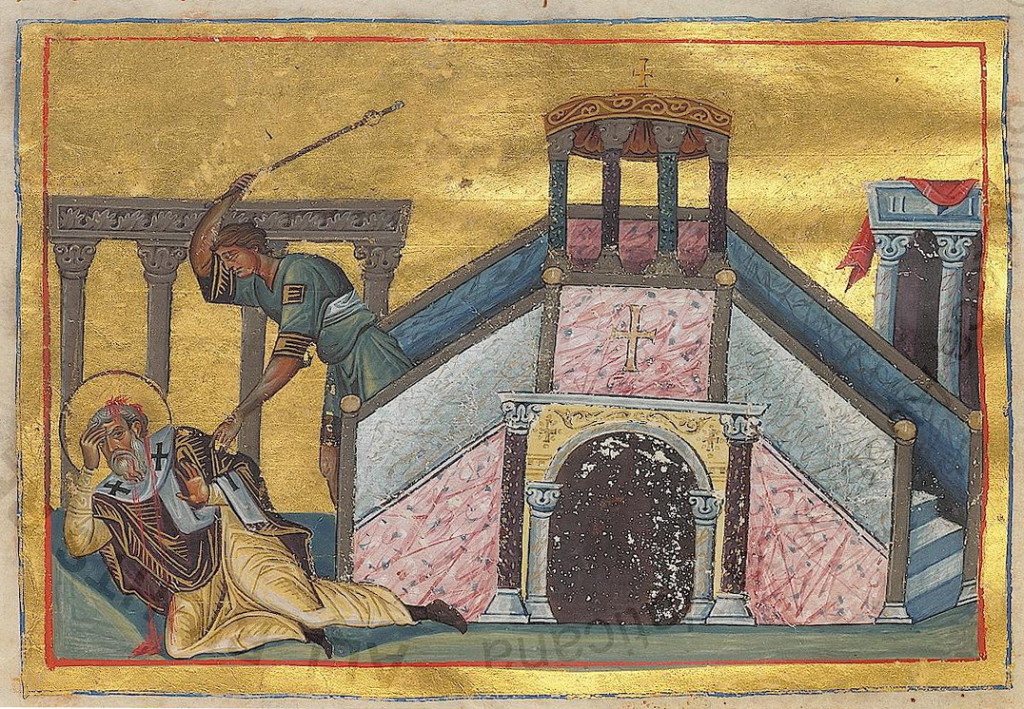 respected by people that they called him James the Just. He was so trusted that the authorities were misled, for they worked out a plan to nip Christianity in the bud. They took James up atop a wall of the temple and instructed him to tell the crowd below that Jesus was not the Messiah. Instead he proclaimed his little Step-brother as Messiah and Lord and Son of God. Then somehow immediately James “just happened” to fall off the wall onto the street. He survived but it was said someone in the crowd hit him in the head with a rock. So James Brother of the Lord was martyred about the year 62.
respected by people that they called him James the Just. He was so trusted that the authorities were misled, for they worked out a plan to nip Christianity in the bud. They took James up atop a wall of the temple and instructed him to tell the crowd below that Jesus was not the Messiah. Instead he proclaimed his little Step-brother as Messiah and Lord and Son of God. Then somehow immediately James “just happened” to fall off the wall onto the street. He survived but it was said someone in the crowd hit him in the head with a rock. So James Brother of the Lord was martyred about the year 62.
The Family of Jesus
I think we all here are concerned by the breakdown of the traditional family in the modern world. But we do need to remember that the Holy Family was anything but a traditional family.
In what follows I am not trying to be irreverent, only to consider how odd the Holy Family must have looked to someone from Nazareth who “didn’t know”:
“Joseph, that old widower on his second marriage! Well, it looks like one those May-December things that old men are sometimes suckers for. I heard how Joseph’s sons and daughters reacted when he came home engaged to this young thing. And I heard that someone said that they heard (many people don’t know this) that when she got pregnant, Joseph said it wasn’t his (little wonder at his age), and that Mary told him…well, you’d never believe it. And even worse Joseph fell for it! He should have had her stoned! No wonder they got out of town to have him born. And then somehow they got into trouble with Herod and had to flee the country and take refuge in Egypt. And after they came home then Jesus never married. Why…?…? All Jewish men get married.
“So then Jesus leaves and when he comes back a couple of years later, he’s gone crazy! He thinks he’s the Messiah! Little wonder they drove him out. And then he refuses to give it up and they execute him. What shame on our little village, every time they call him “Jesus of Nazareth”. And then to make it even worse, his brother James (he seemed like such a good man) falls for it too and becomes leader of this renegade band of heretics, till the authorities have to kill him too! What an awful family! And to think they came from here!”
To repeat, I’m not being irreverent. I’m just trying to imagine how Jesus’ Family looked to people who didn’t believe. A very unusual Family, to put it mildly.
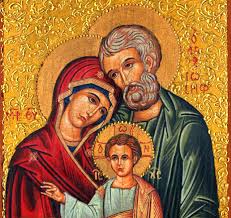
I believe in traditional Christian families. I hope you do, too. They are the foundation of society. The family home is a “little church”. But we do need to remember that out of that very non-traditional Holy Family came Jesus the Christ, and a new and very different kind of Family which has spread over all the world, all of us newly born in Baptism into the Church, the eternal Family of God, all of us fathers and mothers and brothers and sisters in Jesus Christ, a Family that even death can’t destroy.
Who would ever have believed it? Except for One: Jesus of Nazareth.
Next Two Weeks: we return to The Divine Liturgy – The Anaphora

Indeed, Father, a great shame the St Joseph is not given his own special day, although, as you know, he is remembered a second time (as is King David) on the Sunday of the Forefathers. As for David, I wonder if he does need his own particular day as when we recite (or pray) the Psalms, he often gets a mention. almost a daily “Saints Day”.
Thank you for your thought provoking and entertaining Blog.
On the Sunday after Christmas this past Nativity, (Dec 29), our priest said that the Orthodox Church remembers Joseph on the Sunday after Nativity. He then proceeded to deliver a wonderful homily teaching us many of the same things you wrote here regarding his age, his children but mostly he spoke of Joseph’s obedience to God. We too are Antiochian.
“But I cannot help but think that when Christ descended into hades to rescue the dead, that when He first saw Joseph Jesus said to him, “Father!” And that Joseph said to Him, “My son!””
Love this! <3